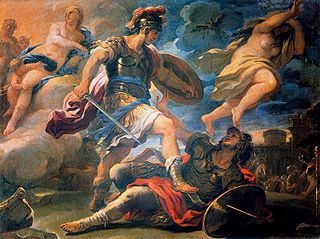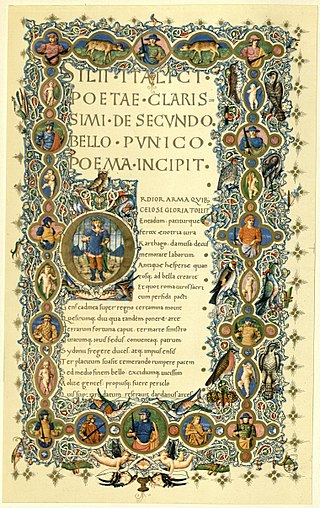Related Research Articles

Quintus Fabius Maximus Verrucosus, surnamed Cunctator, was a Roman statesman and general of the third century BC. He was consul five times and was appointed dictator in 221 and 217 BC. He was censor in 230 BC. His agnomen, Cunctator, usually translated as "the delayer", refers to the strategy that he employed against Hannibal's forces during the Second Punic War. Facing an outstanding commander with superior numbers, he pursued a then-novel strategy of targeting the enemy's supply lines, and accepting only smaller engagements on favourable ground, rather than risking his entire army on direct confrontation with Hannibal himself. As a result, he is regarded as the originator of many tactics used in guerrilla warfare.

Publius Vergilius Maro, usually called Virgil or Vergil in English, was an ancient Roman poet of the Augustan period. He composed three of the most famous poems in Latin literature: the Eclogues, the Georgics, and the epic Aeneid. A number of minor poems, collected in the Appendix Vergiliana, were attributed to him in ancient times, but modern scholars generally regard these works as spurious, with the possible exception of a few short pieces.

Vesta is the virgin goddess of the hearth, home, and family in Roman religion. She was rarely depicted in human form, and was more often represented by the fire of her temple in the Forum Romanum. Entry to her temple was permitted only to her priestesses, the Vestal Virgins. Their virginity was deemed essential to Rome's survival; if found guilty of inchastity, they were buried or entombed alive. As Vesta was considered a guardian of the Roman people, her festival, the Vestalia, was regarded as one of the most important Roman holidays. During the Vestalia privileged matrons walked barefoot through the city to the temple, where they presented food-offerings. Such was Vesta's importance to Roman religion that following the rise of Christianity, hers was one of the last non-Christian cults still active, until it was forcibly disbanded by the Christian emperor Theodosius I in AD 391.

In Roman mythology, Romulus and Remus are twin brothers whose story tells of the events that led to the founding of the city of Rome and the Roman Kingdom by Romulus, following his fratricide of Remus. The image of a she-wolf suckling the twins in their infancy has been a symbol of the city of Rome and the ancient Romans since at least the 3rd century BC. Although the tale takes place before the founding of Rome around 750 BC, the earliest known written account of the myth is from the late 3rd century BC. Possible historical bases for the story, and interpretations of its local variants, are subjects of ongoing debate.
In Greek mythology, Dardanus was the founder of the city of Dardanus at the foot of Mount Ida in the Troad.

Ascanius was a legendary king of Alba Longa and the son of the Trojan hero Aeneas and Creusa, daughter of Priam. He is a significant figure in Roman mythology because of his genealogy: as the son of the Roman founding father Aeneas, himself the son of the goddess Venus and the Trojan prince Anchises, he was regarded as an ancestor of the Roman people. Under his additional name Iulus, he was claimed as the particular ancestor of the gens Iulia, the family of Julius Caesar, and therefore a progenitor of the first line of Roman emperors, the Julio-Claudian dynasty. In some Roman genealogies, he is also made to be an ancestor of Romulus and Remus. Together with his father, he is a major character in Virgil's Aeneid.

In Roman mythology, Evander was a culture hero from Arcadia, Greece, who was said to have brought the pantheon, laws, and alphabet of Greece to ancient Italy, where he founded the city of Pallantium on the future site of Palatine Hill, Rome, sixty years before the Trojan War. He instituted the festival of the Lupercalia. Evander was deified after his death and an altar was constructed to him on the Aventine Hill.

In Greek and Roman mythology, Cacus was a fire-breathing giant and the son of Vulcan. He was killed by Hercules after terrorizing the Aventine Hill before the founding of Rome.

Turnus was the legendary King of the Rutuli in Roman history, and the chief antagonist of the hero Aeneas in Virgil's Aeneid.

The Palatine Hill, which relative to the seven hills of Rome is the centremost, is one of the most ancient parts of the city; it has been called "the first nucleus of the Roman Empire". The site is now mainly a large open-air museum whilst the Palatine Museum houses many finds from the excavations here and from other ancient Italian sites.

The gens Fabia was one of the most ancient patrician families at ancient Rome. The gens played a prominent part in history soon after the establishment of the Republic, and three brothers were invested with seven successive consulships, from 485 to 479 BC, thereby cementing the high repute of the family. Overall, the Fabii received 45 consulships during the Republic. The house derived its greatest lustre from the patriotic courage and tragic fate of the 306 Fabii in the Battle of the Cremera, 477 BC. But the Fabii were not distinguished as warriors alone; several members of the gens were also important in the history of Roman literature and the arts.

Tiberius Catius Asconius Silius Italicus was a Roman senator, orator and epic poet of the Silver Age of Latin literature. His only surviving work is the 17-book Punica, an epic poem about the Second Punic War and the longest surviving poem in Classical Latin at over 12,000 lines.
Pallantium was an ancient city near the Tiber river on the Italian peninsula. Roman mythology, as recounted in Virgil's Aeneid for example, states that the city was founded in Magna Graecia by Evander of Pallene and other ancient Greeks sometime previous to the Trojan War. In addition, Dionysius of Halicarnassus writes that Romans say that the city was founded by Greeks from Pallantium of Arcadia, about sixty years before the Trojan war and the leader was Evander. Solinus writes that the Arcadians were the founders of the city.

The kings of Alba Longa, or Alban kings, were a series of legendary kings of Latium, who ruled from the ancient city of Alba Longa. In the mythic tradition of ancient Rome, they fill the 400-year gap between the settlement of Aeneas in Italy and the founding of the city of Rome by Romulus. It was this line of descent to which the Julii claimed kinship. The traditional line of the Alban kings ends with Numitor, the grandfather of Romulus and Remus. One later king, Gaius Cluilius, is mentioned by Roman historians, although his relation to the original line, if any, is unknown; and after his death, a few generations after the time of Romulus, the city was destroyed by Tullus Hostilius, the third King of Rome, and its population transferred to Alba's daughter city.

In Roman mythology, Pallas was the son of King Evander. In Virgil's Aeneid, Evander allows Pallas to fight against the Rutuli with Aeneas, who takes him and treats him like his own son Ascanius. In battle, Pallas proves he is a warrior, killing many Rutulians. Pallas is often compared to the Rutulian Lausus, son of Mezentius, who also dies young in battle. Tragically, however, Pallas is eventually killed by Turnus, who takes his sword-belt, which is decorated with the scene of the fifty slaughtered bridegrooms, as a spoil. Throughout the rest of Book X, Aeneas is filled with rage (furor) at the death of the youth, and he rushes through the Latin lines and mercilessly kills his way to Turnus. Turnus, however, is lured away by Juno so that he might be spared, and Aeneas kills Lausus, instead, which moves Aeneas to pity.

Brennus or Brennos was an ancient Gallic chieftain of the Senones. In c. 387 BC, he defeated the Romans at the Battle of the Allia. Later that year, he led an army of Cisalpine Gauls in their attack on Rome and captured most of the city, holding it for several months. Brennus's sack of Rome was the only time in 800 years the city was occupied by a non-Roman army before the fall of the city to the Visigoths in 410 AD.

Romulus was the legendary founder and first king of Rome. Various traditions attribute the establishment of many of Rome's oldest legal, political, religious, and social institutions to Romulus and his contemporaries. Although many of these traditions incorporate elements of folklore, and it is not clear to what extent a historical figure underlies the mythical Romulus, the events and institutions ascribed to him were central to the myths surrounding Rome's origins and cultural traditions.
In Greek mythology, Pallas was an Arcadian prince and the eponymous founder of the Arcadian town of Pallantion. He was the teacher of Athena, who, according to local myths, was born in Aliphera.

The Punica is a Latin epic poem in seventeen books in dactylic hexameter written by Silius Italicus, comprising some twelve thousand lines. It is the longest surviving Latin poem from antiquity. Its theme is the Second Punic War and the conflict between the two great generals Hannibal and Scipio Africanus. The poem was re-discovered in either 1416 or 1417 by the Italian humanist and scholar Poggio Bracciolini.
The gens Herminia was an ancient patrician house at Rome. Members of the gens appear during the first war between the Roman Republic and the Etruscans, circa 508 BC, and from then to 448 BC. Two members of the family held the consulship, Titus Herminius Aquilinus in 506 BC, and Lars Herminius Aquilinus in 448.